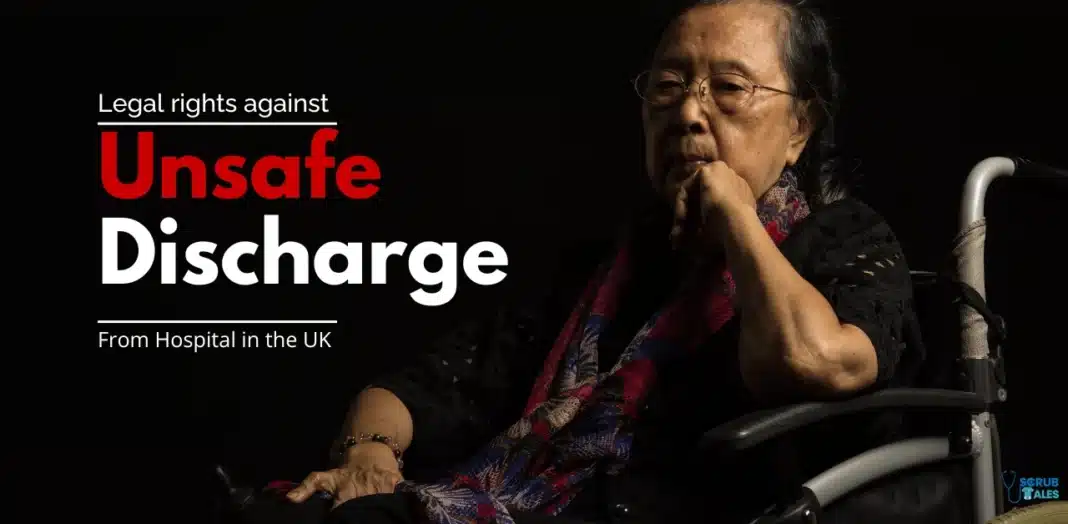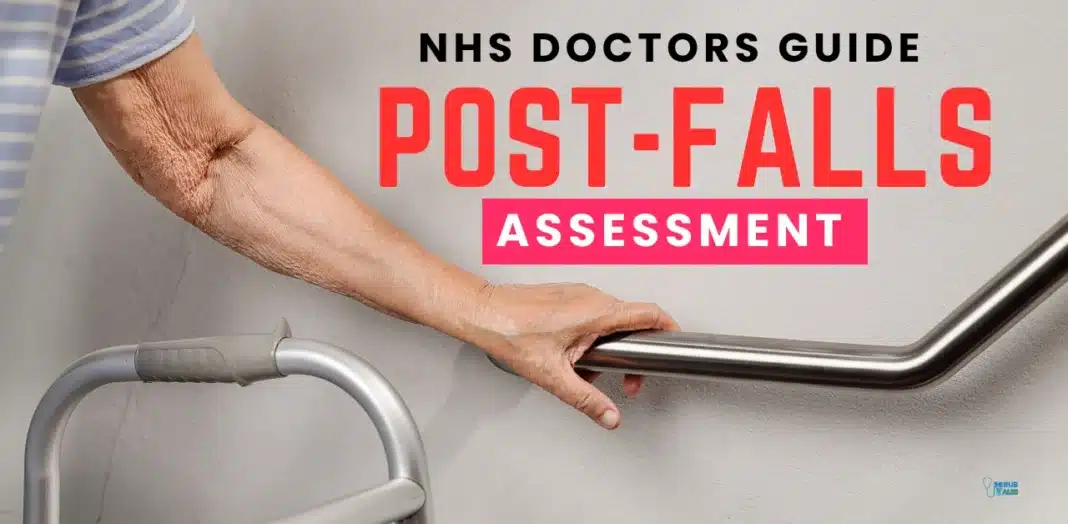As a dental graduate, one of the things that sticks in your thoughts is: What after BDS? We all struggle with anxiety about the future and career options after BDS:
“I should prepare for my master’s like everyone else, wait, NO! I should start my practice.”
For Gen‑Z dentists, balancing interests, work-life harmony, financial prospects, and long-term satisfaction is key.
No one talks about the non-clinical options that are equally progressive and can offer a better work-life balance.
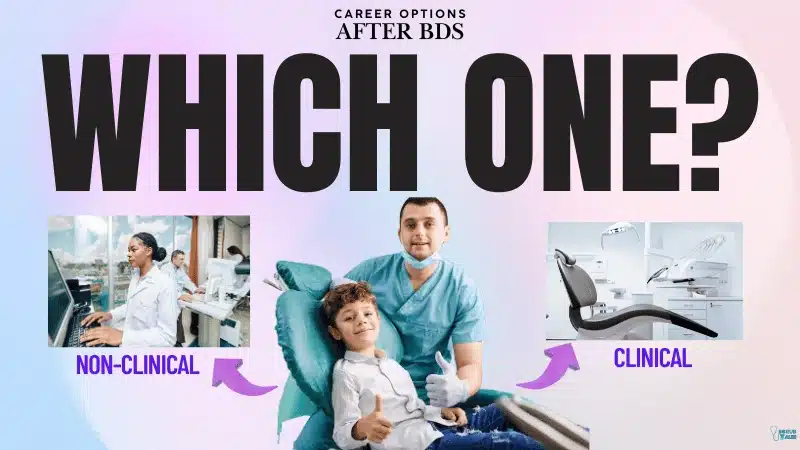
Clinical Options After BDS
1. Private Dental Practice
Many BDS graduates choose to open their clinics or join an established dental practice. Here, you perform restorations, root canal treatments, extractions, or cosmetic procedures.
Pros (particularly for Gen‑Z):
- Autonomy and Flexibility in managing your own hours and practice style.
- Visible impact– immediate outcomes and patient satisfaction resonate with Gen Z’s search for meaningful work.
- Earning potential can be substantial in urban areas.
- Digital advantage– your tech-savvy skills can help you grow through online marketing and tele-dentistry.
Cons:
- Equipment, rent, and staffing are expensive up front.
- At first, work-life balance may suffer.
- The competitive environment: It takes work to stand out in a crowded market.
- The possibility of burnout due to time constraints and repetitive treatments.
2. Master of Dental Surgery (MDS)
After getting a BDS, it usually takes three more years to get an MDS specialisation, like orthodontics, endodontics, prosthodontics, oral surgery, or periodontics.
Pros:
- A lot of specialist knowledge, which usually costs a lot.
- There are jobs in schools or hospitals, such as teaching or consulting.
- High professional standing- being seen as an expert.
- Global mobility– experts are needed all over the world.
Cons:
- Income that comes later and tuition that lasts for several years.
- Very competitive entrance with few available seats.
- Long hours and high-pressure environments, especially when handling complex cases, can be particularly challenging.
- A narrow focus that might feel limiting to people who like having a lot of options.
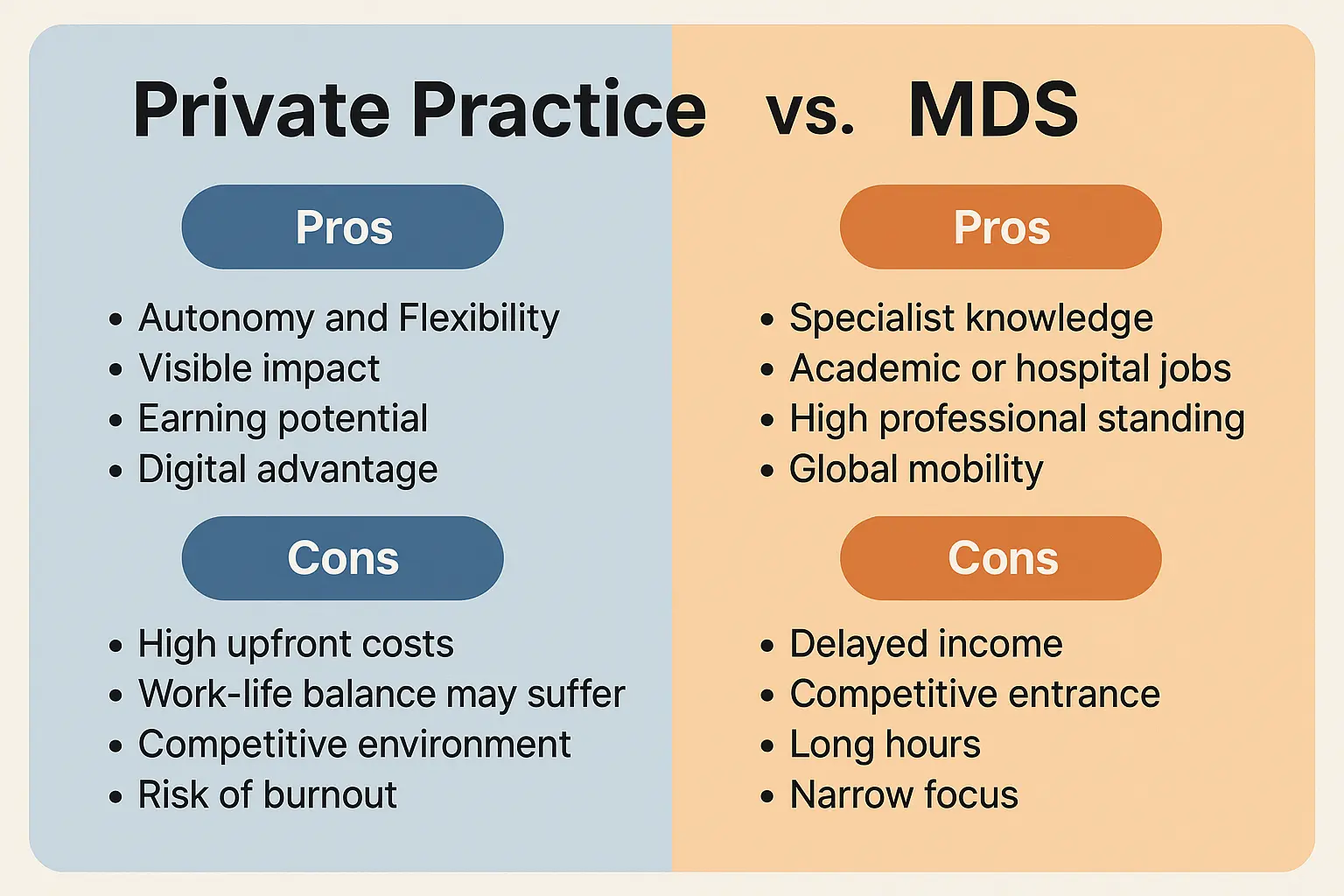
3. Dentistry in a hospital
Working in a hospital or NHS clinic, often in oral surgery, trauma care, or treating patients with health problems, gives you:
- Reliable pay and benefits, which are great for financial stability.
- An environment that promotes teamwork is something many Gen Z workers find appealing.
- Handling a variety of challenging and intricate cases.
However, compared to private practice, there may be shift work, less freedom, and lower pay.
These positions allow you to apply your dental education without seeing patients directly. They often align well with Gen Z’s values of innovation, flexibility, and making a bigger impact.
Non-Clinical Options After BDS
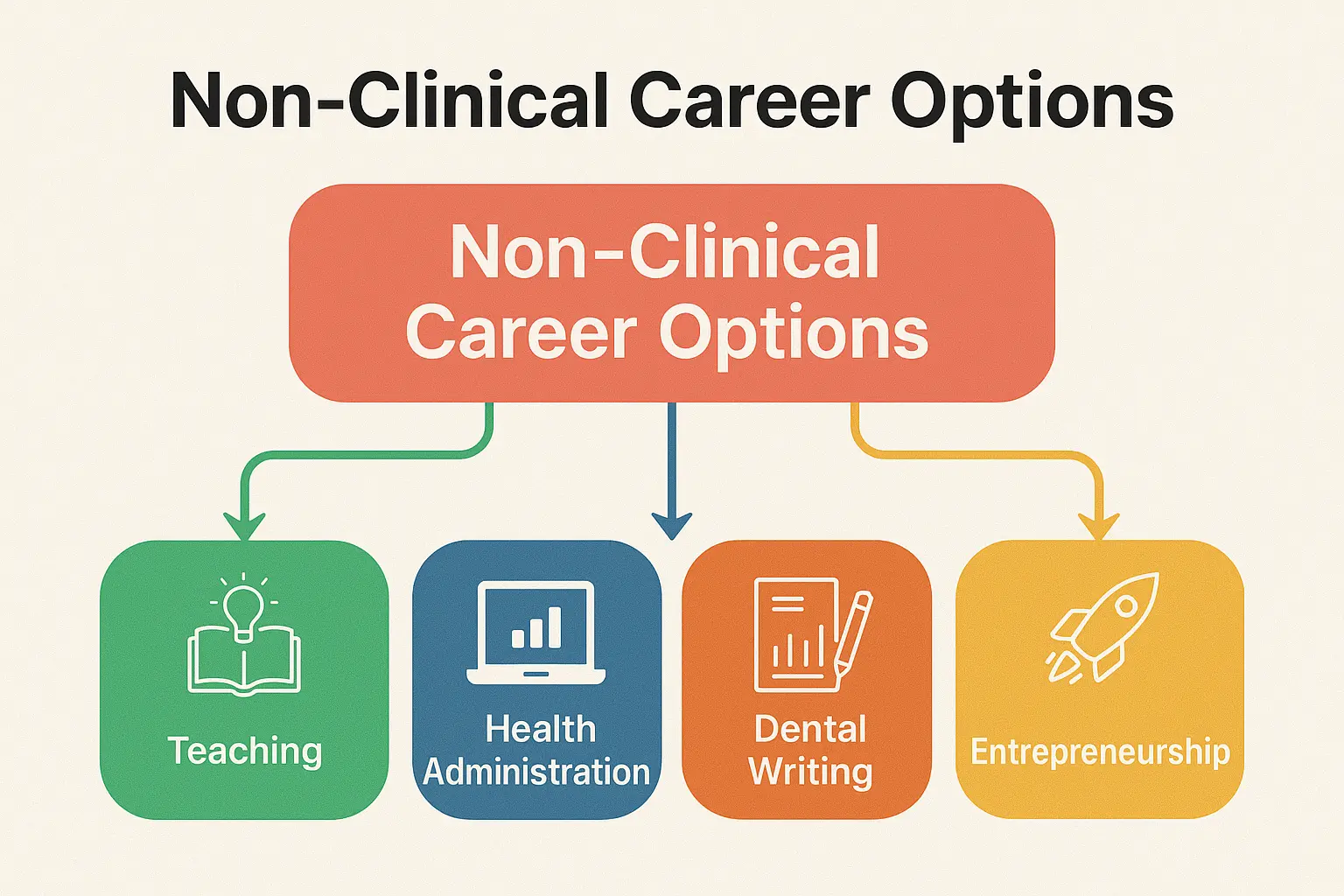
1. Public Health Dentistry
This can include work in oral health policy, education, outreach, and community programs.
Pros:
- You can create social impact by helping at the community (or national) level.
- Obtain regular hours, leading to a more consistent work-life balance.
- There is work with NGOs, the government, and international agencies (World Health Organisation and UNICEF).
Cons:
- Compensation is less than clinical practice.
- The impact is less noticeable or visceral, since it’s indirect rather than face-to-face.
- Bureaucracy can be complicated for those who want “fast” changes.
How to get started: Consider a Master’s in Public Health (MPH) with an emphasis in Dentistry. You could also volunteer in campaigns or NGOs. Additionally, it would be helpful to have skills in epidemiology, policy, and/or data analysis.
2. Biotechnology & Dental Research
In the world of biotechnology, you could be working on developing novel dental materials, dental implants, and regenerative treatments.
Pros:
- Excellent sense for people who are motivated by working in innovative/technological settings.
- In many cases, hybrid or remote work is used.
- Interprofessional collaboration with scientists and engineers.
Cons:
- May require further training (ex., MSc or PhD in Biotechnology).
- Research and development timelines may not be ideal for Gen-Z, who prefer the instantaneous.
- Limited patient interaction.
3. Clinical Research & Trials
Roles include Clinical Research Associate, trial coordinator, or data analyst for dental pharmaceuticals or devices.
Pros:
- Innovative treatments and technologies.
- Steady and regulated career path, mostly CROs, universities, or industry.
- Generally, trials are run with a global perspective and are conducted internationally.
Cons:
- High regulatory compliance, lots of paperwork.
- Little patient interaction.
- A lot of pressure to turn things around quickly.
How to get there: Certificate or a Master’s in Clinical Research; Intern at a CRO or lab; develop statistical, regulatory, and GCP skillsets.
Clinical vs. Non-Clinical Options After BDS: A Gen‑Z Perspective
| Aspect | Clinical Pathways | Non-Clinical Pathways |
| Work–Life Balance | Often demanding and irregular | More predictable hours and flexibility |
| Earnings & Growth | High potential in private or specialist practice | Varies—some roles offer mid to high earnings |
| Direct Impact | Fast, tangible patient outcomes | Systemic impact, broader societal contributions |
| Education Funding | Additional degrees like MDS are almost always needed | Depending on the role: MPH, MSc, or certificate is necessary |
| Variety & Flexibility | Lower once the position is fixed | Greater openness- research, travel, remote work |
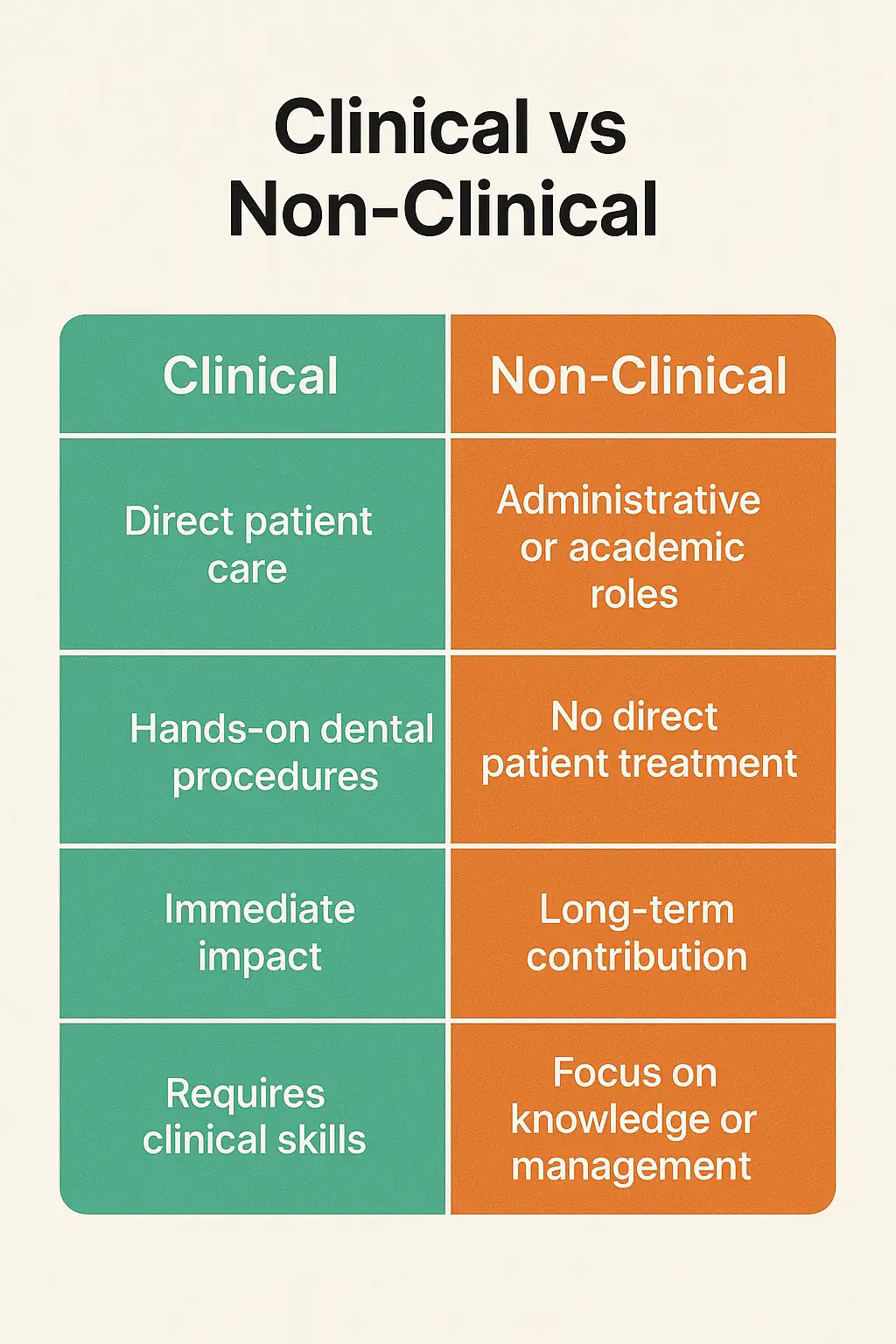
Suggestions for new & recent Gen Z BDS graduates
- Be inquisitive: Seek opportunities to shadow clinicians in your area of interest & consider other regions of careers (consultancies, NGOs, research assistantships, biotech, technical support work, etc).
- Continue to learn: take a course for CAD/CAM dentistry, learn how to use social media for marketing, learn more about data analytics, or learn more about AI applications in dentistry, etc.
- Network: Utilise LinkedIn & other social media platforms to stay in touch with your dental school peers and explore their diverse career paths. Participate in local and national dental (society) and academic conferences.
- Stay passionate & realistic: ensure you balance your career passions and interests, with your financial aspirations, lifestyle needs, and personal principles/values.
- Be resilient & adaptable: understand that things in dental practice are changing. New delivery formats such as teledentistry will open new opportunities. AI augmented diagnostics, digital treatment planning (CAD/CAM), etc.
Final Words
In conclusion, a new & recent BDS degree provides Gen Z professionals with considerable flexibility.
You can pursue a career focused on clinical care for patients, specialist career pathways in clinical care through an MDS degree, and/or non-clinical pathways such as aspects of public health, biotechnology, or research.
Aligning your chosen career with your values, whether they be social justice, financial freedom, or work-life balance, can lead to happiness and career success.

